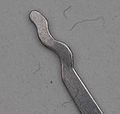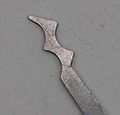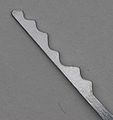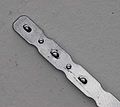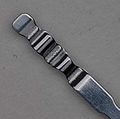Raking: Difference between revisions
From Lockwiki
Jump to navigationJump to search
m (Reverted edits by 67.131.20.93 (Talk) to last revision by Datagram) |
No edit summary |
||
| Line 6: | Line 6: | ||
__NOTOC__ | __NOTOC__ | ||
== Gallery == | == Gallery == <!-- Please try to keep these as varied as possible! --> | ||
<div align="center"><gallery> | |||
File:Lockpicking Raking C rake.jpg| C rake | |||
File:Lockpicking Raking S rake.jpg| S rake | |||
File:Lockpicking Raking L rake.jpg| L rake | |||
File:Lockpicking Raking Dimple rake dimpled.jpg | A dimpled [[dimple]] rake. | |||
File:Lockpicking Raking Dimple rake wavy.jpg | A wavy [[dimple]] rake. | |||
</gallery></div> | |||
== See also == | == See also == | ||
Revision as of 15:43, 19 June 2009
Raking
Raking (or rake picking) is a style of lockpicking used against pin-tumbler or wafer locks. Raking is characterized by the pick being lightly brushed against the components, often with an up-down motion to simulate a wide variety of component positions. Tension may also be varied while raking to increase the chances of picking the lock.
Picks specifically designed for rake picking are commonly known as "rakes". Wafer rakes may also be referred to as "auto-jigglers", due to the popularity of wafer locks on automobiles. Though the choice of rake is personal preferrence, the C and S rakes are the most popular.
Gallery
See also
| This article is a stub. You can help Lockwiki by expanding it. |
